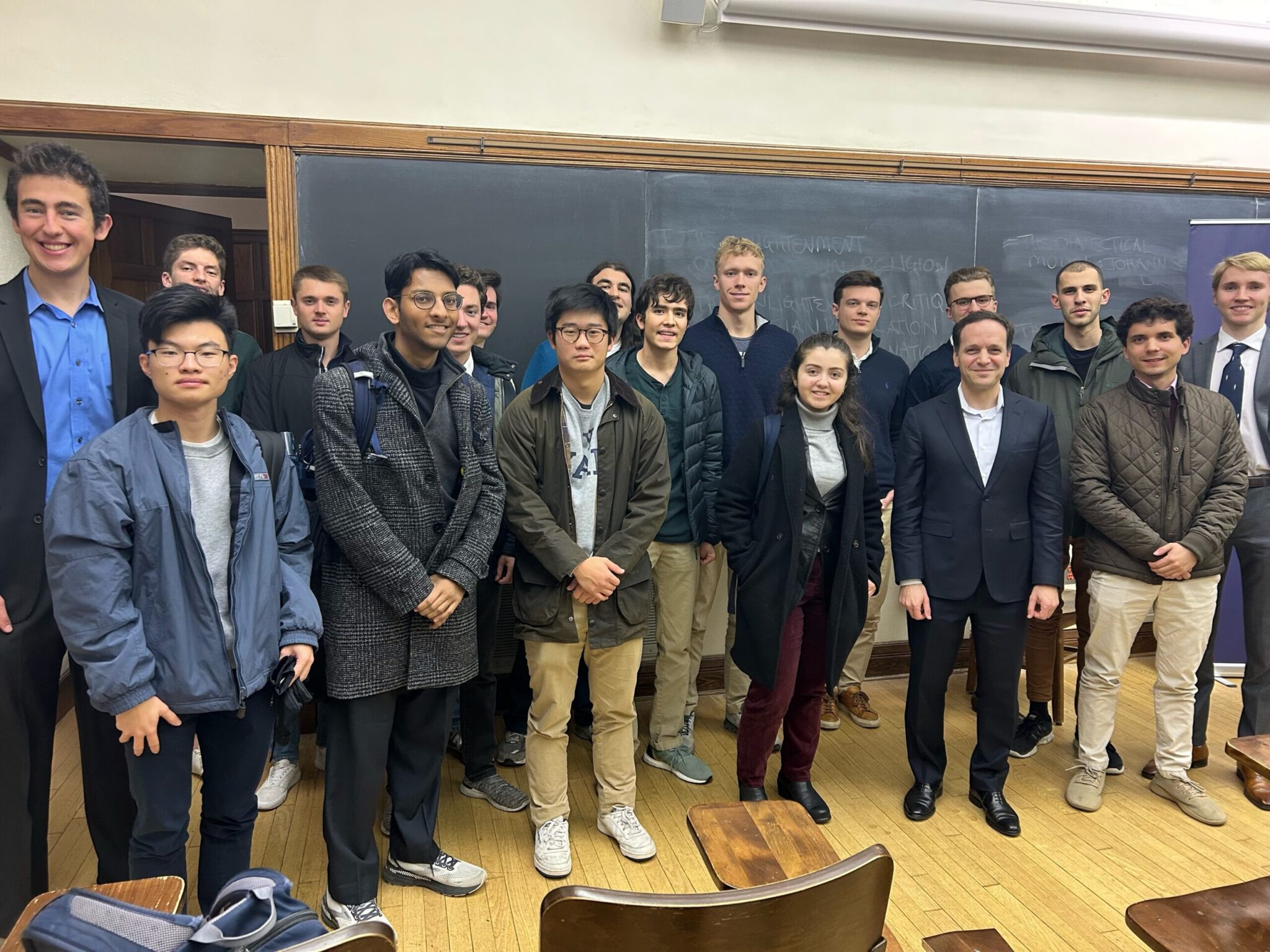Alexander Hamilton Society hosts discussion on impact of Russia-Ukraine War on Asian geopolitics
Vance Serchuk LAW ’09 addressed the ramifications of the Russia-Ukraine war in Asia during an event organized by the Yale chapter of the Alexander Hamilton Society on Nov. 14.

Courtesy of Abe Baker-Butler
On Tuesday evening, the Yale chapter of the Alexander Hamilton Society hosted an event to discuss the effects of the war in Ukraine on Asian geopolitics.
The talk, titled “Ripples to the Pacific: How Ukraine Affects Geopolitics in Asia,” took place in William Harkness Hall. The speaker at the event was Vance Serchuk LAW ’09, executive director of the global investment firm KKR Global Institute. During the event, Serchuk examined the potential repercussions of the war on conflicts in Asia.
On Feb. 24, 2022, Russia invaded Ukraine, escalating the Russo-Ukrainian War that started in 2014 when Russian troops occupied Crimea and parts of Donbas. Despite calls for a ceasefire in Ukraine, fighting has continued, leading to thousands of casualties and the displacement of civilians.
“The Alexander Hamilton Society (AHS) is excited to host KKR’s Vance Serchuk because of his ability to connect two regions that have increasingly come to define U.S. foreign policy: the Indo-Pacific and Eastern Europe, specifically Ukraine,” Axel de Vernou ’25, co-president of the AHS, wrote to the News. “Mr. Serchuk will be able to provide students with an overview of what developments in Ukraine signal for American foreign and defense policy in the Indo-Pacific.”
He added that Serchuk’s connection to both geopolitics and finance — two subjects that, according to Vernou, are often studied separately — allowed the AHS to reach more students.
At the event, Serchuk first addressed the impacts of the war on Euro-Atlantic security.
“The impact has been transformative,” Serchuk said. “The world that we find ourselves in today versus the world that existed [before the war] are obvious and transparent.”
Serchuk said that since the war, there has been a significant expansion of territory incorporated into the North Atlantic Treaty Organization, marked by the inclusion of both Finland and Sweden. He also spoke about a growing awareness of Europe’s reliance on Russian gas.
He said that since the war first started, numerous changes have unfolded in the Euro-Atlantic region economically, politically and militarily. Serchuk contended that the historical repercussions of the war might be most prominently felt in its effects on Indo-Pacific geopolitics.
“The impact of the Indo-Pacific and the geopolitics there may prove to be even more consequential than this war,” he said.
Serchuk expressed his curiosity about how the United States and its allies will draw lessons from the war, particularly concerning the power dynamics between the People’s Republic of China and Taiwan.
He emphasized that the war demonstrated the perils of economic dependence, drawing parallels with the European reliance on Russian gas and suggesting that comparable dynamics might exist between China and Taiwan.
“If it wasn’t such a smart thing for us to depend on Russian gas, maybe we should take a look at our other dependencies in other countries with revisionist geopolitical ambitions,” Serchuk explained.
He noted that discussions in the United States regarding critical minerals and pharmaceuticals dependence on other nations have “accelerated” since the start of the war.
Serchuk concluded the talk by warning the United States and its allies that they need to be careful about the power imbalance in the Indo-Pacific region and emphasizing the need to understand the significance of the war.
“Supporting Ukraine’s fight for freedom, through military support and economic policy, is essential to a free and open Indo-Pacific, and indeed, for a free world,” Abe Baker-Butler ’25, co-president of the AHS, wrote to the News. “At AHS, we bring together renowned practitioners with diverse perspectives for high-level foreign policy discussion with students. We launch our members into careers in foreign policy and national security.”
Ukraine is the second largest country in Europe by total area.







